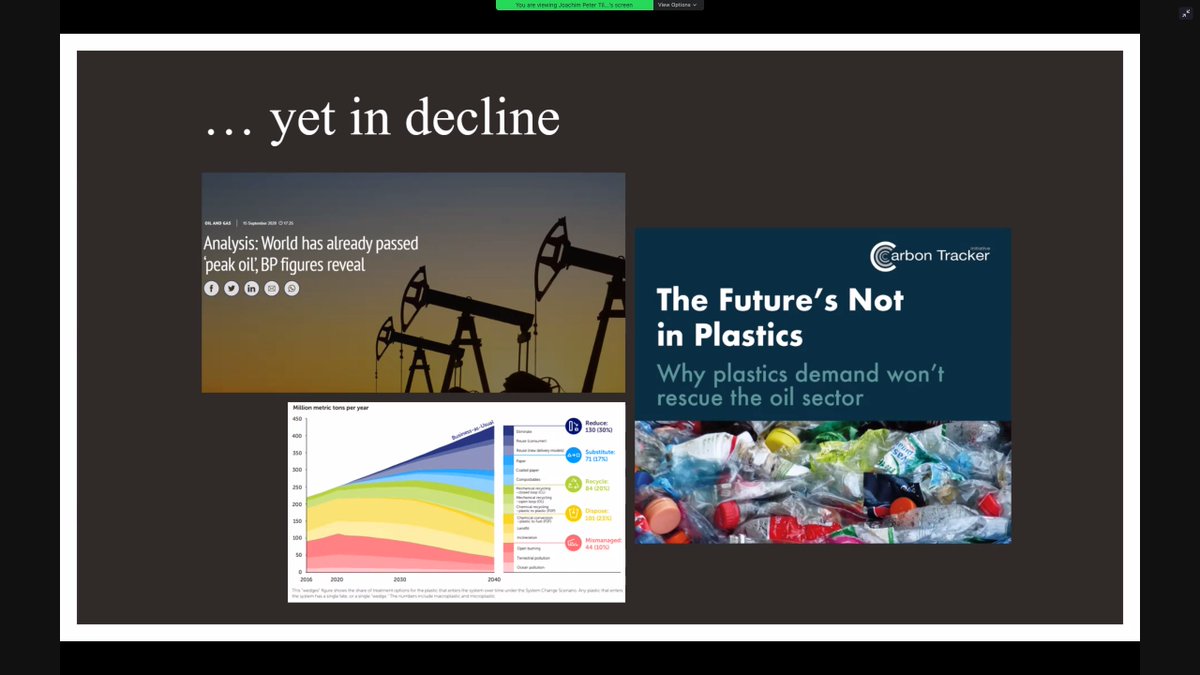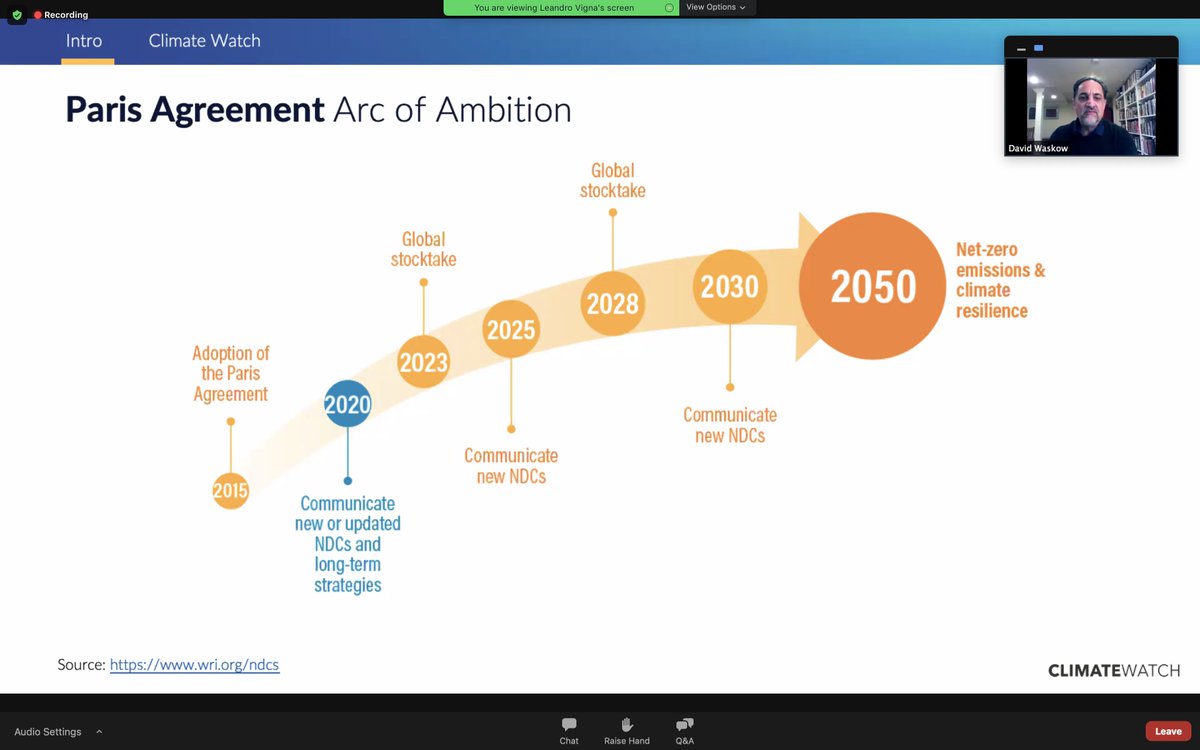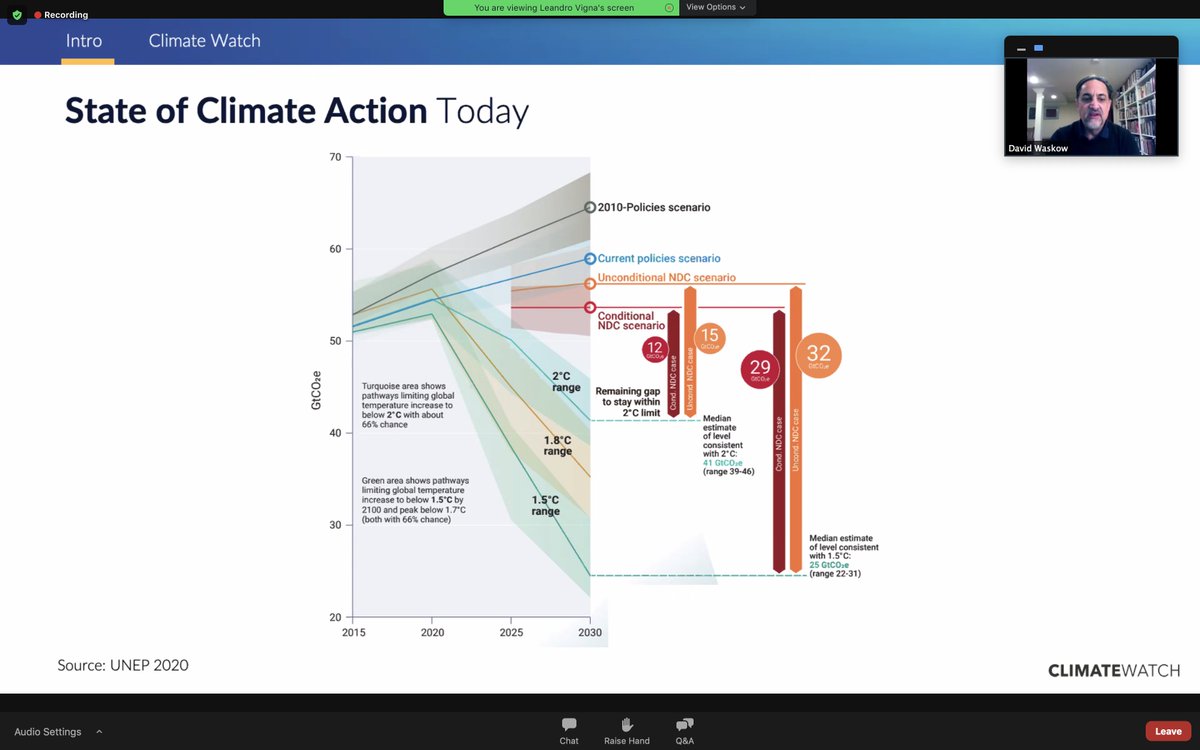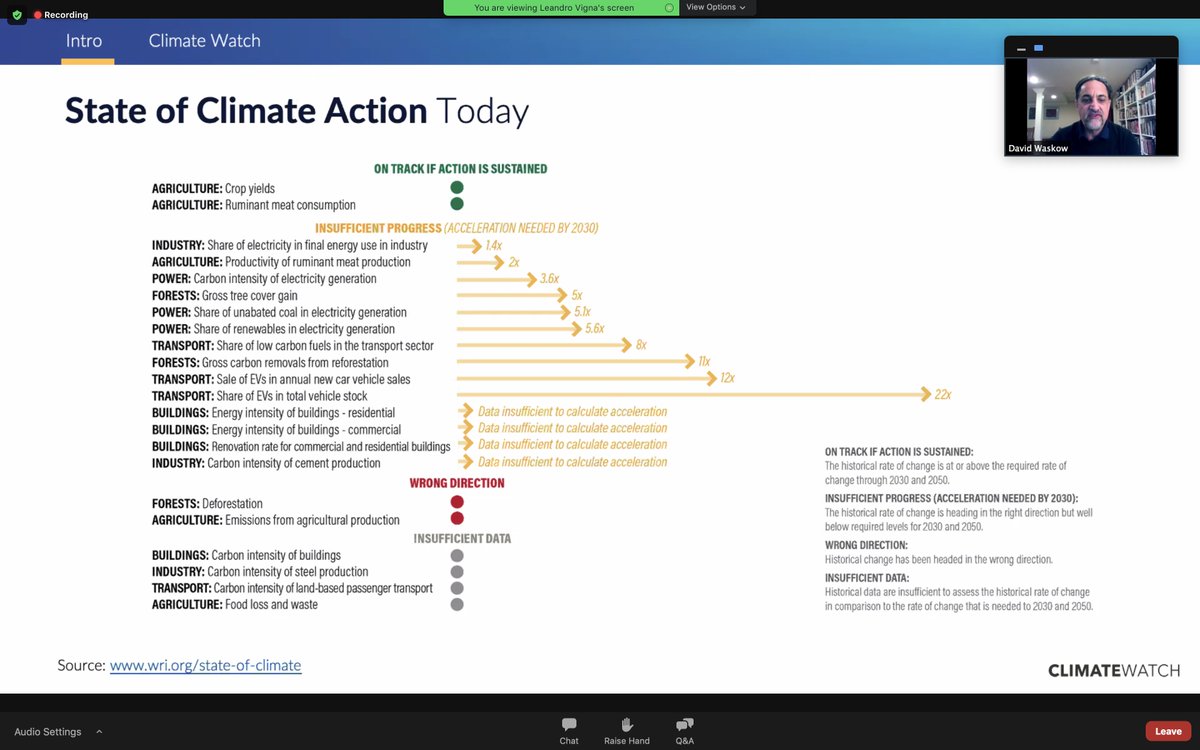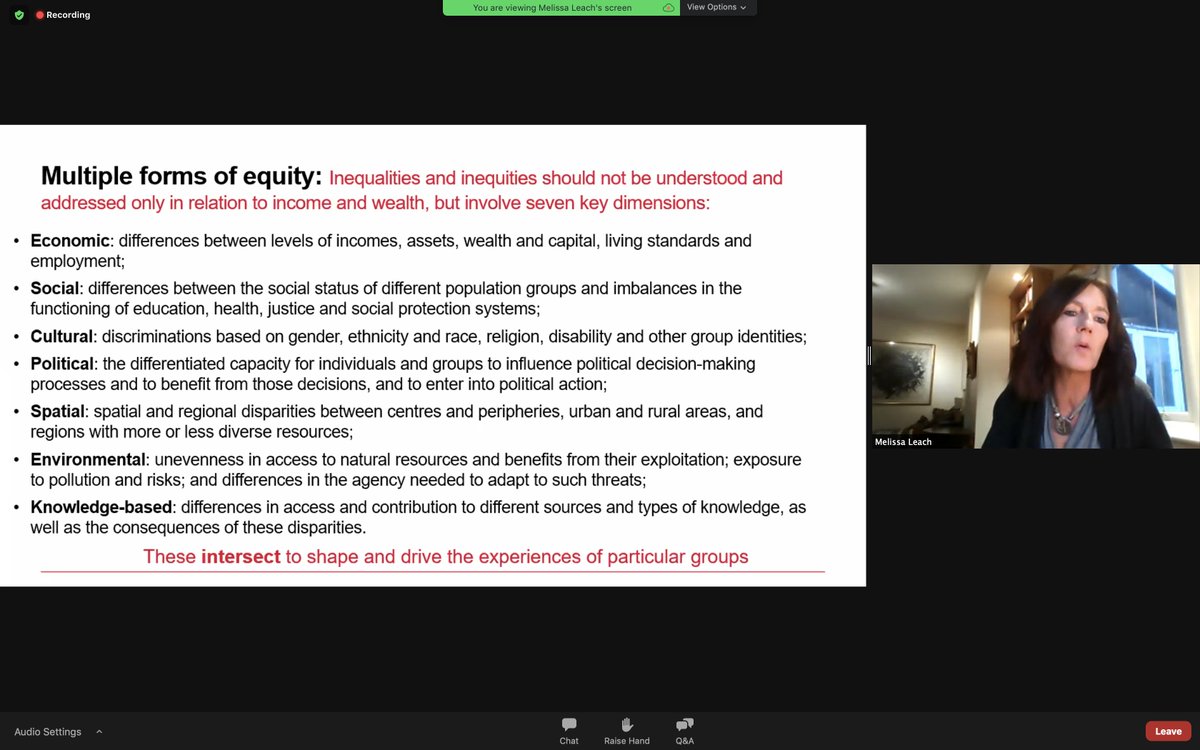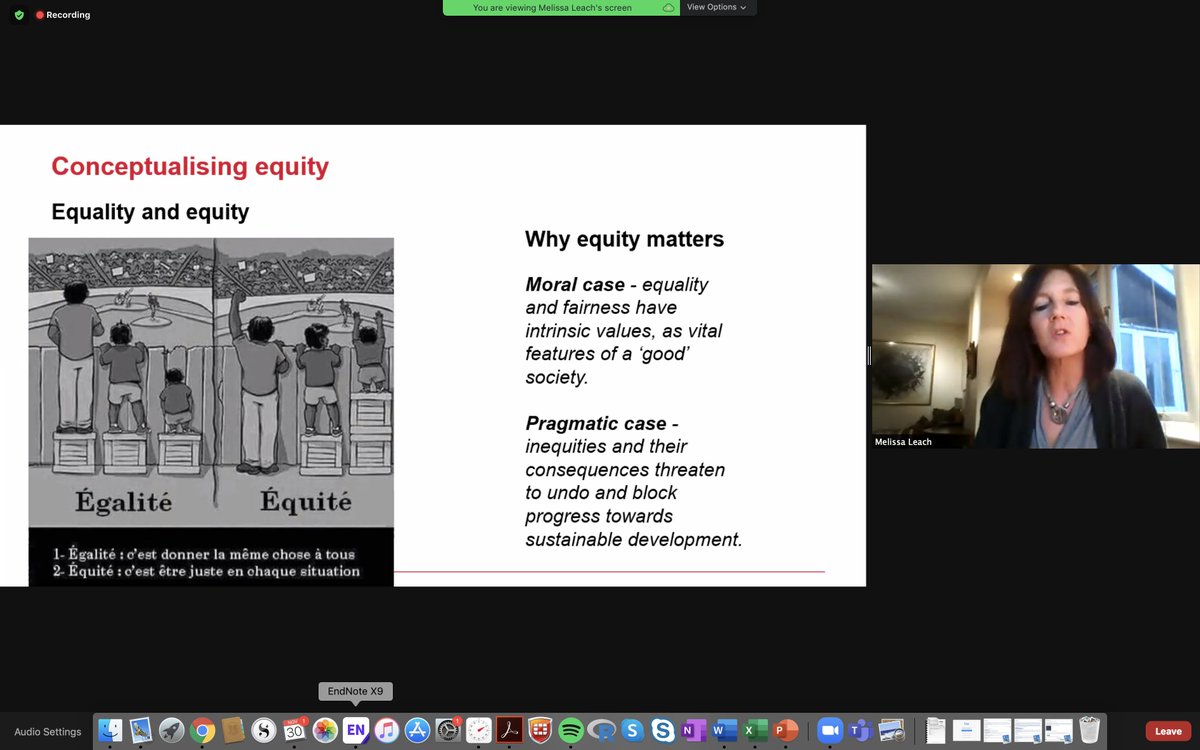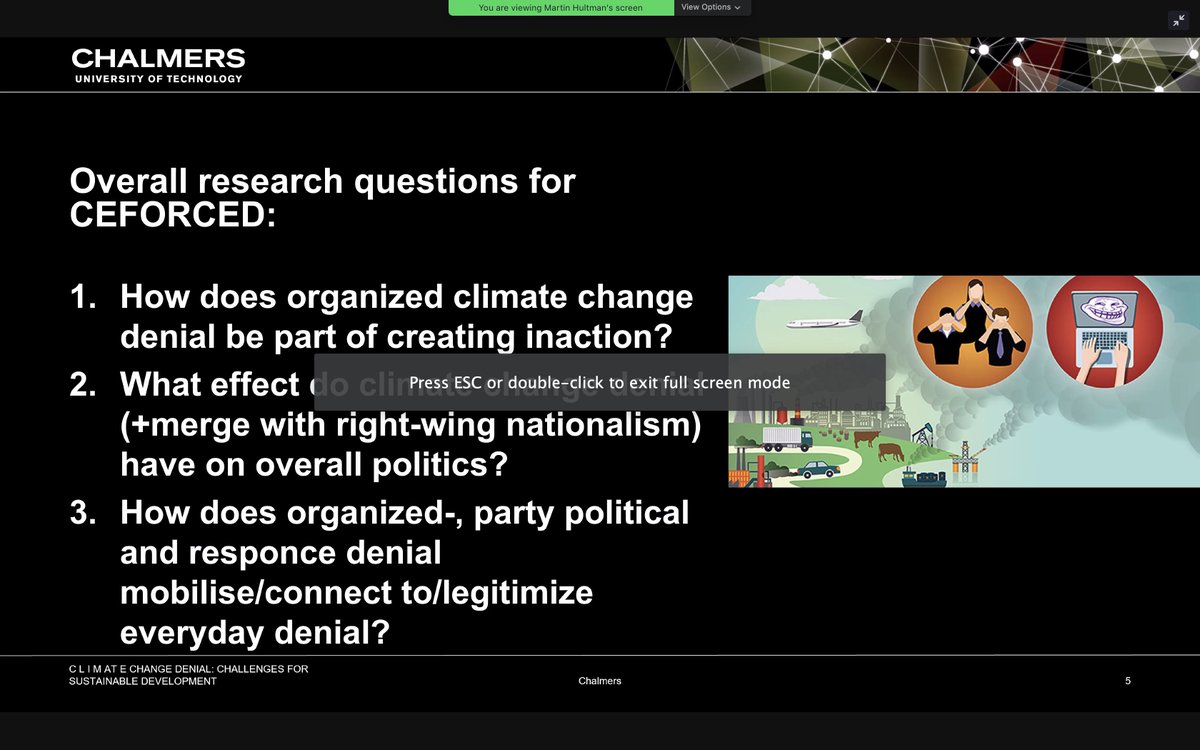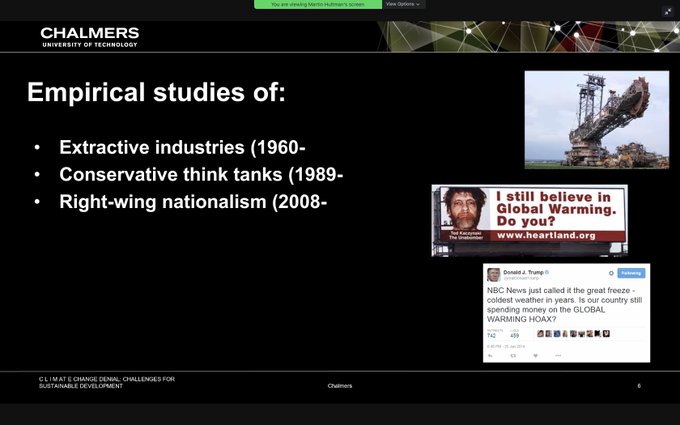
Live tweeting from the co2-budget.com conference. First up: the inimitable @KevinClimate, who never minces words. Distressingly little progress for the climate emergency, compared with covid response. 1/n 

2. Reminder: It's the carbon budget, the area under the emissions curve, that determines warming. More emissions now means more (up to impossible) cuts later. @KevinClimate
3. Net zero is NOT based on a total carbon budget (which forces us to face actions demanded today). Net zero is focused on far future (2045, 2050)- generational passing of the buck to future policymakers & scientists. Assumes all tons are =, ignores GHGs, sources. @KevinClimate
4. @KevinClimate is not opposed to carbon dioxide removal/carbon capture/nature-based solutions. Here's his position: research, require stringent sustainability standards- but mitigate NOW assuming they will not work at scale. Energy must be real (not net) zero emissions. 

5. More problems with net zero climate target: UK 2050 targets assume substantial fossil emissions 2050 + beyond (more than avg Kenyan today!). Assumes massive carbon removal massively deployed by future generations. From physics (C budget) to legal (highest poss). @KevinClimate 




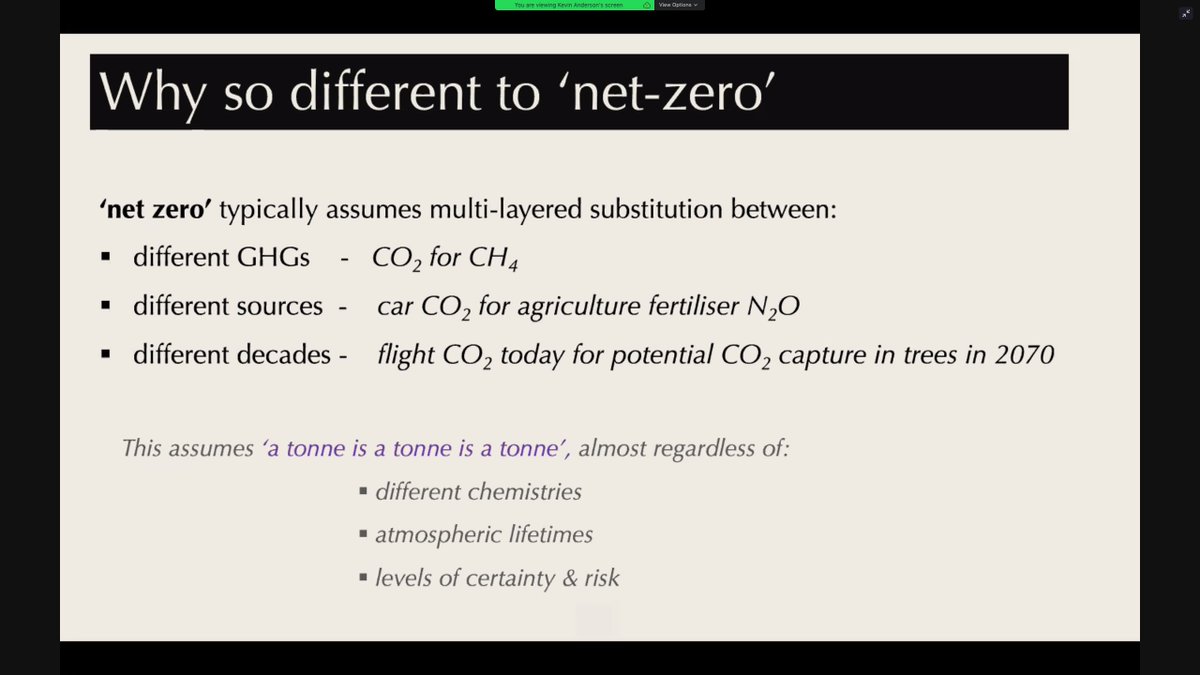

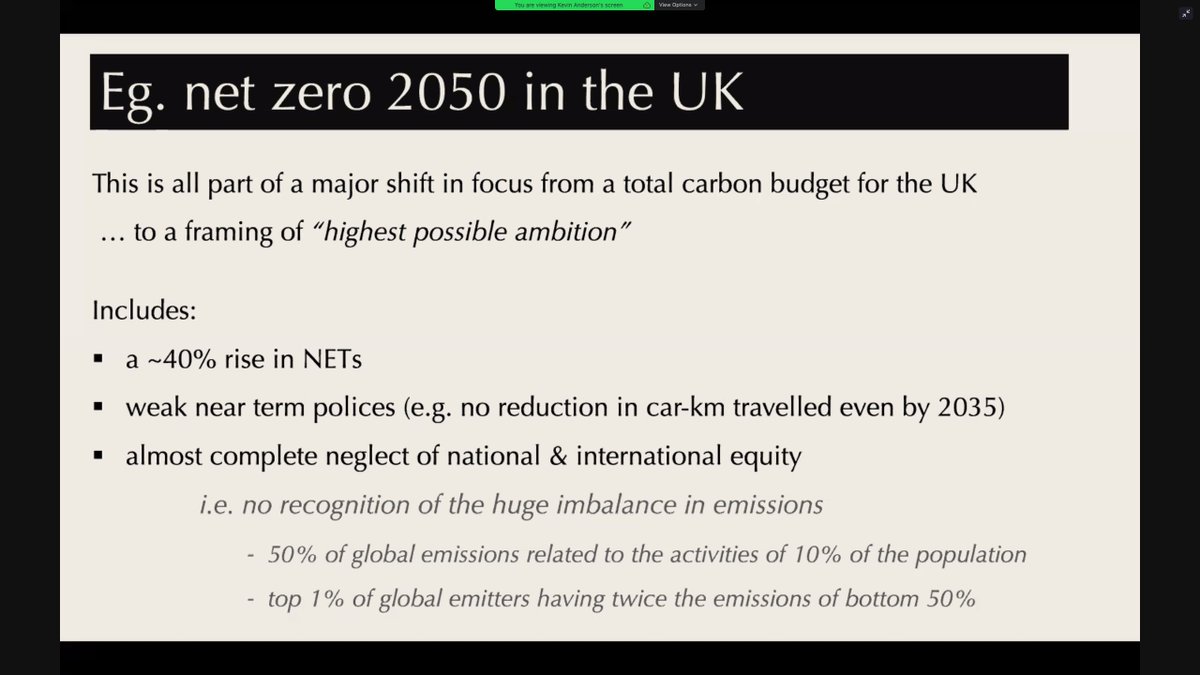
6. "Highest possible ambition" for UK #netzero 2050 doesn't envision any reduction in car km-traveled by 2035... misses equity by failing to focus on high emitters... disguises incremental tinkering of business as usual as real Paris-worthy ambition. @KevinClimate 

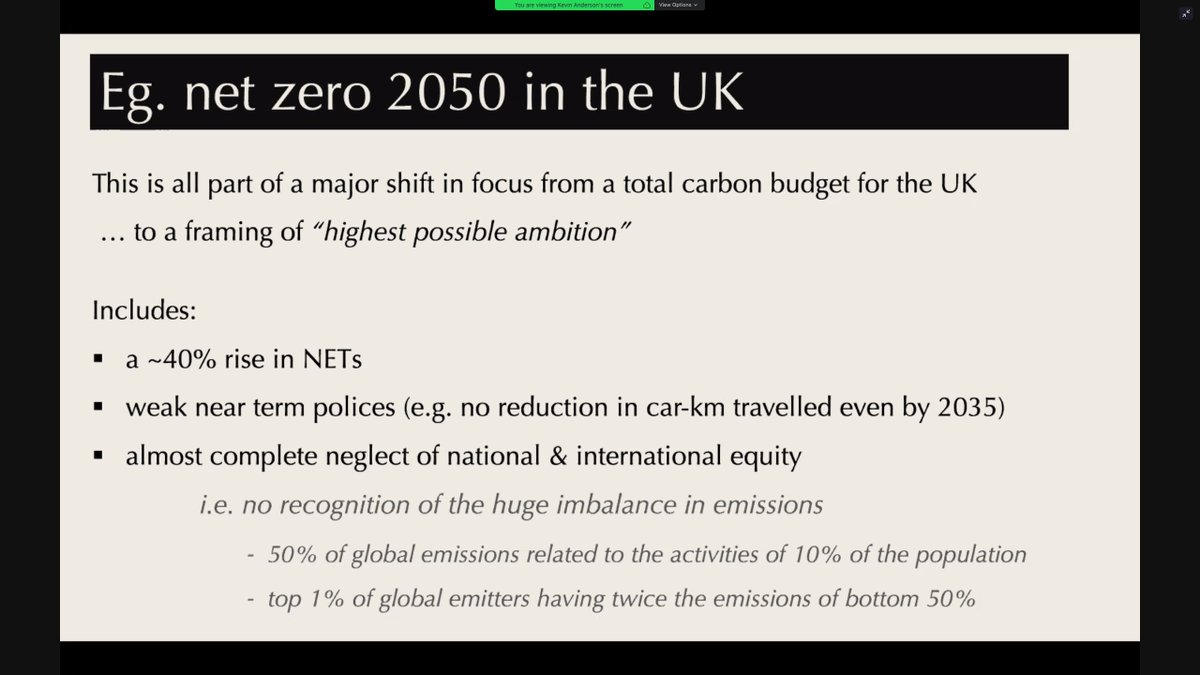
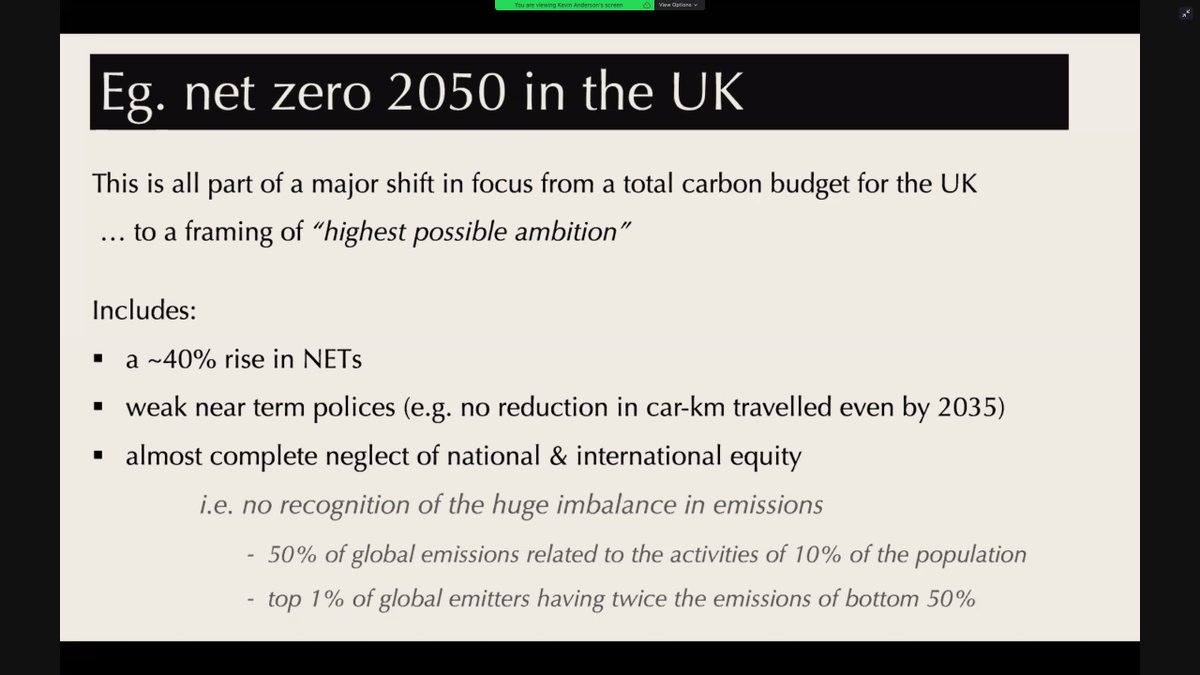
7. Analysis by @KevinClimate shows "leading" #netzero focused, UK and Swedish climate policies are headed for 2.5-3°C. Their carbon budgets are 2-3x higher than real Paris-compliant budget for 1.5-2°C. 
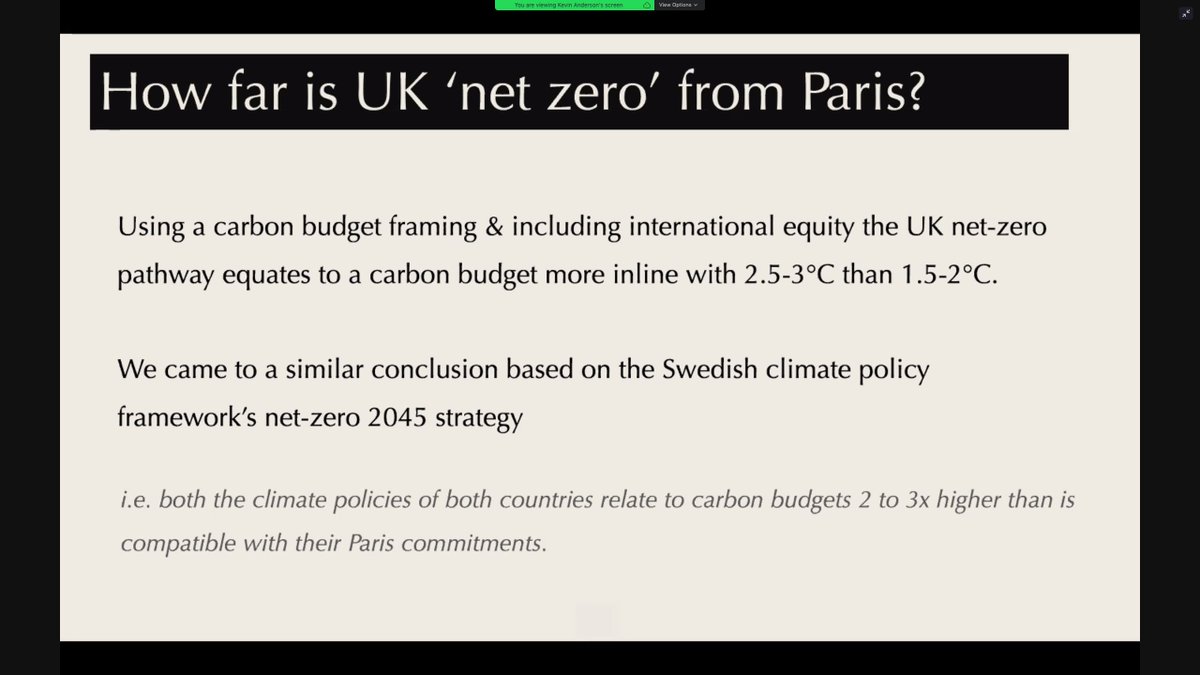
8. Replace #netzero with carbon budgets aligned w/ Paris 1.5-2°C; key is NO SUBSTITUTION between categories to remove fiddling. Need real zero for all energy by 2035; separate target for process emissions (also real zero 2035, help poor countries w/ cement for devt) @KevinClimate 

9. Stark choices from @KevinClimate:
#NetZero 2050= Burden our children & fail #ParisAgreement, keep business as usual;
Real zero by 2035 ("if that sounds impossible, then we should have started earlier; we did the impossible within 2 years for covid and the banking crisis")


#NetZero 2050= Burden our children & fail #ParisAgreement, keep business as usual;
Real zero by 2035 ("if that sounds impossible, then we should have started earlier; we did the impossible within 2 years for covid and the banking crisis")
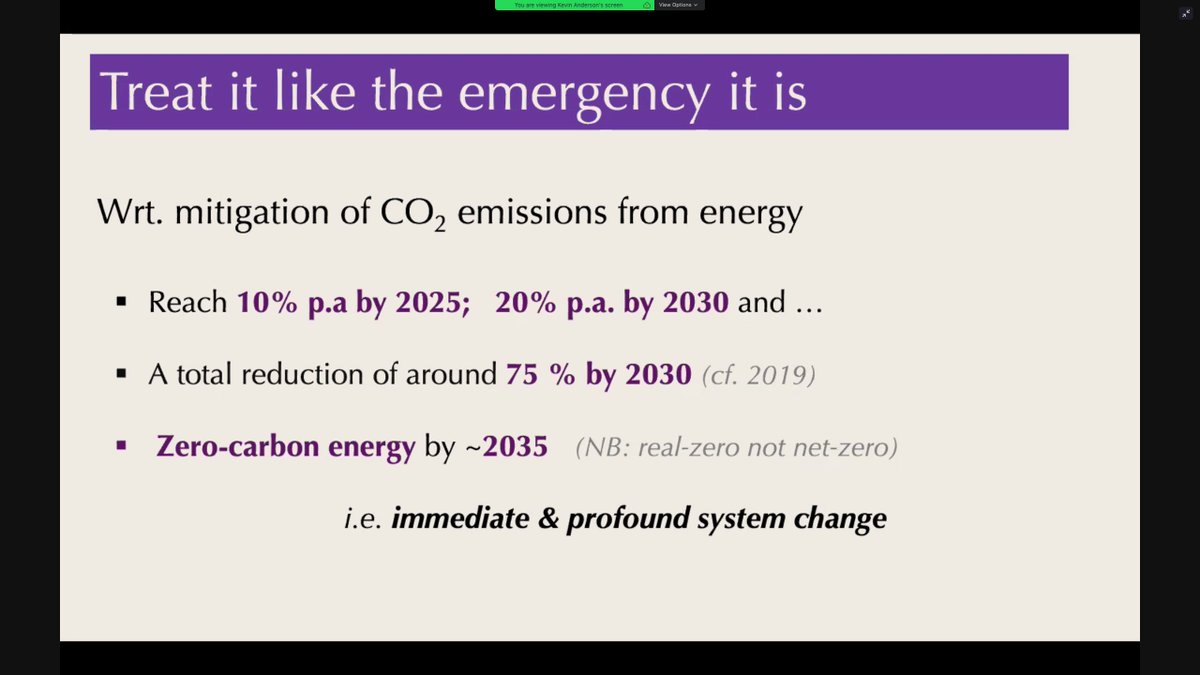
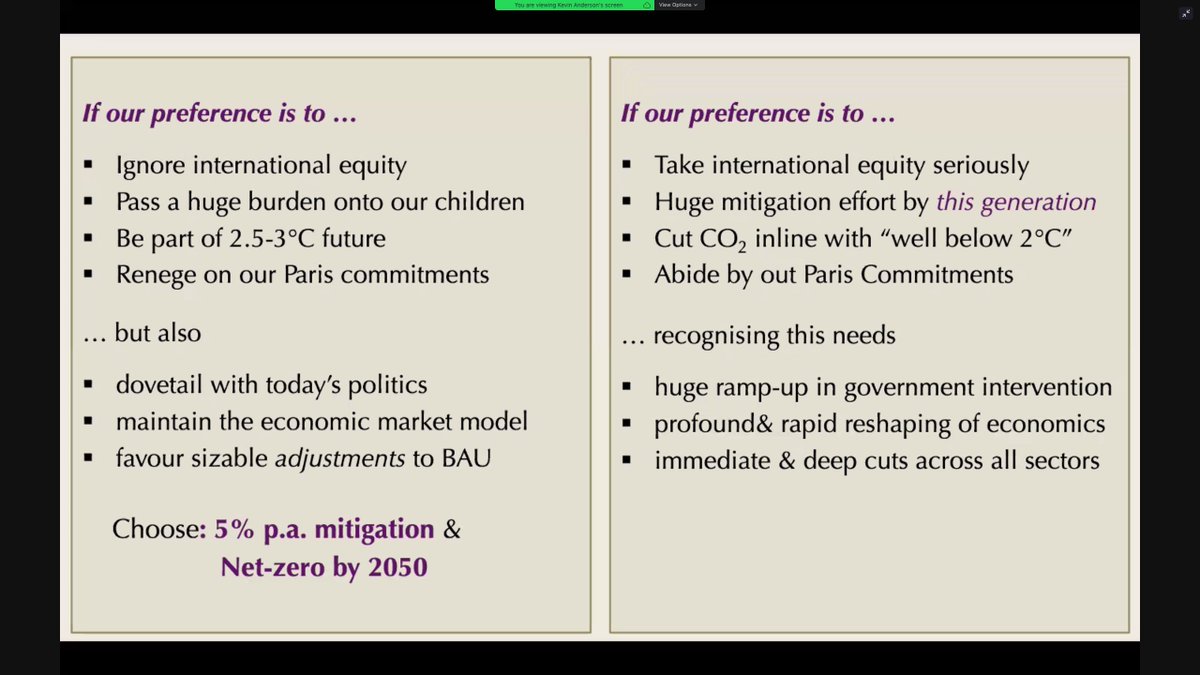

10. What abt fair climate mitigation? "We've left [emissions reductions] so late that the best we can hope for is the least unfair approach." One option, represent other's interests in negotiations (e.g., US represents Ghana). But ea country sovereign own C budget. @KevinClimate
11. Recognizing carbon inequality means that mitigation will look different btwn countries & classes. To meet Paris climate targets, high emitters need to make profound lifestyle changes; physical infrastructure change will addresse most emissions for average folks. @KevinClimate
12. @KevinClimate: For 1.5°C warming, we should be aiming for 0.5-1t CO2e/person by 2035 from agricultural emissions (methane + N20). Plant-based diets will help lower these, as will best agricultural practices.
13. "We've chosen to squander our opportunity to do something fair about climate change, the rich countries squandered our budgets years ago. Historical emissions need to inform our humility, not our share of carbon budgets." @KevinClimate
14. To get to zero carbon, we must "reorient the productive capacity of society." We'll be making trams, not cars. The quicker we can build renewable energy, the faster we'll move away from fossil fuels. Clean energy is instead of, not on top of, business as usual. @KevinClimate
15. @KevinClimate's view on climate policy: Use different policy suites depending on cultural context, but each country needs to do what's necessary to meet its carbon budget. Global carbon tax becomes a narrative of climate delay, will never happen.
16. #scicomm pluralist @KevinClimate on communicating #climate: "I like PowerPoint presentations, but they haven't changed the world so far. There's not 1 right vision of what the future is, let's have all sorts of visions. Communication is key, but there are multiple right ways"
17. Local carbon budgets are tools for municipalities to tweak/shake the system, from:
1. account for carbon
2. support collaboration
3. take tougher regulations
4. critique norms/structures shaping current mitigation. Sanna Gunnarsson @KTHuniversity #co2budget2021
1. account for carbon
2. support collaboration
3. take tougher regulations
4. critique norms/structures shaping current mitigation. Sanna Gunnarsson @KTHuniversity #co2budget2021
18. Int'l labor unions promoted #JustTransition for decades to overcome "jobs vs. climate" divide. Sweden's version of JT is "fossil-free welfare state".@JohanGardebo found key diffs from local (survival) vs. central (coordinate) unions in Sweden's high-C industry. #co2budget2021 



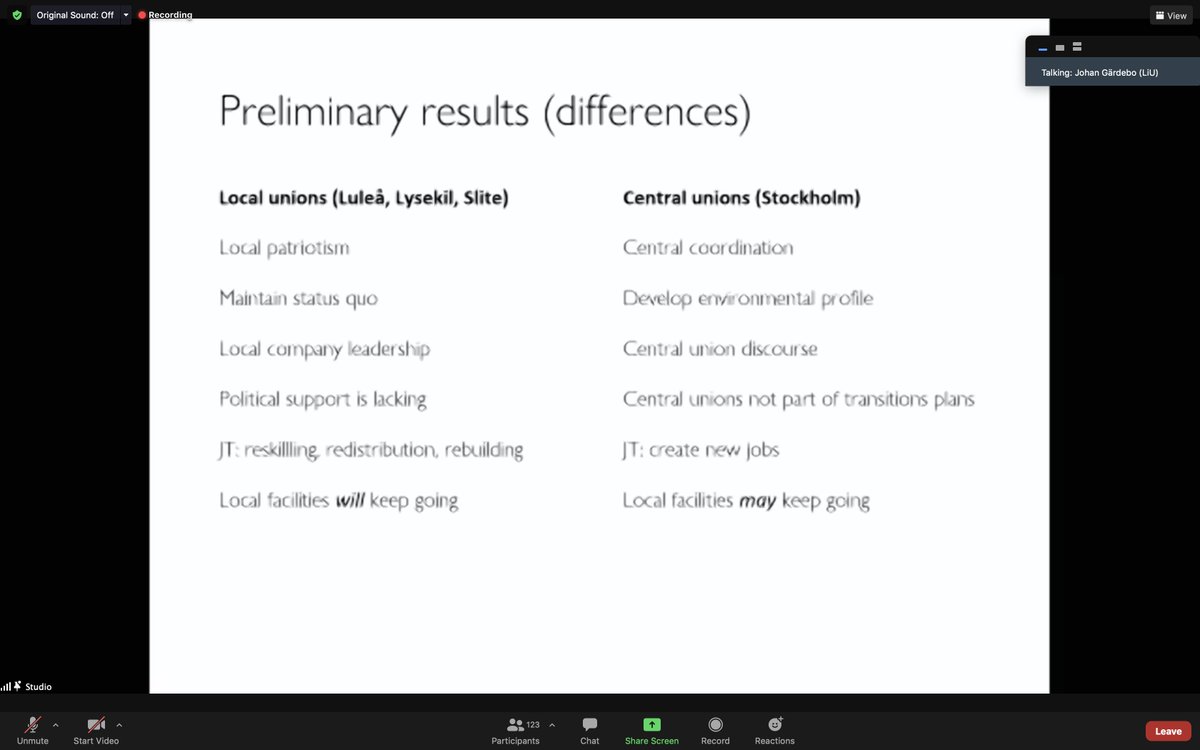
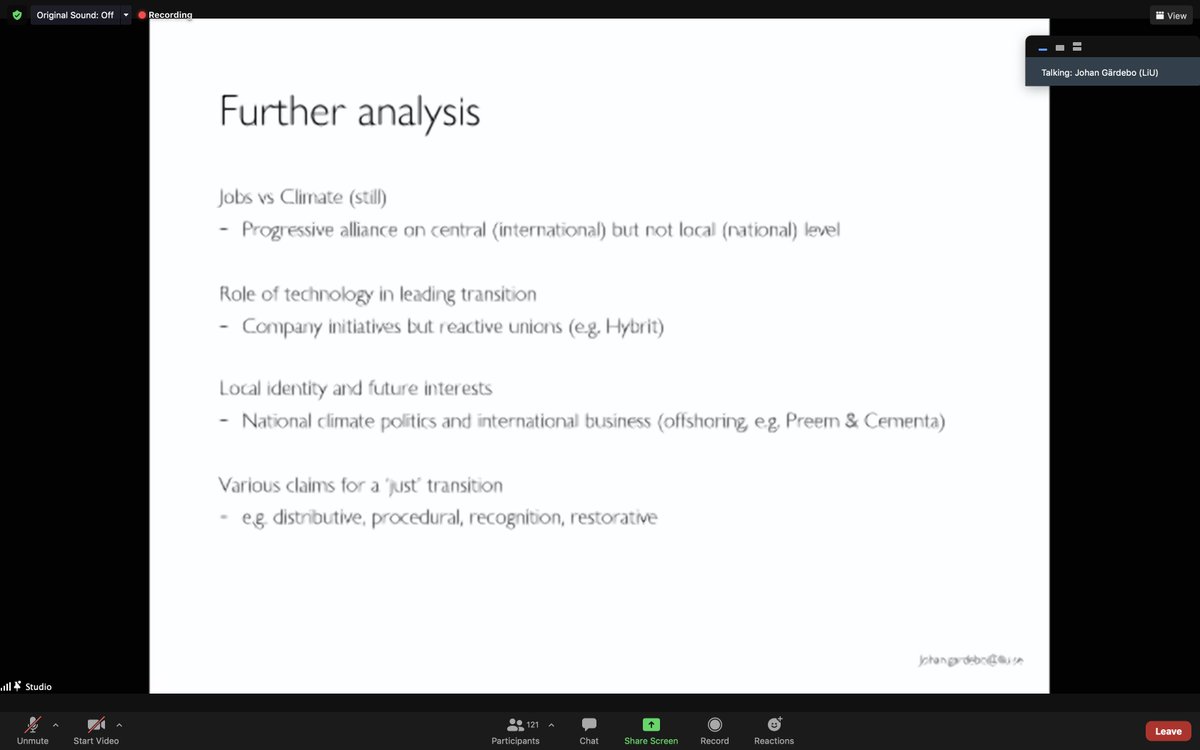
19. Look to history for evidence of #JustTransitions, like closing wharves in Sweden in 70s, advises @JohanGardebo. Are fossil industries going to die or transition to something else? How can we imagine the future we need? #co2budget2021
20. Stefania Barca & colleagues are working on #JustTransition including both:
redistribution of costs/benefits +
providing recognition for the value of jobs- historically industrial jobs over-valued, care under-valued
climatechangeleadership.blog.uu.se/jtc-initiative/
#co2budget2021
redistribution of costs/benefits +
providing recognition for the value of jobs- historically industrial jobs over-valued, care under-valued
climatechangeleadership.blog.uu.se/jtc-initiative/
#co2budget2021
21. Carbon trading only exists in today's weak climate framework. If we're serious about necessary reductions for 1.5°C, no country, no sector will have extra carbon capacity for using trading to shift away their burden.
@KevinClimate #co2budget2021
@KevinClimate #co2budget2021
22. Science can inform, but can't tell us what's dangerous; that's a messy, unfair, political value judgment process, which has deemed 1.5-2° "least unacceptable". The worry is the rate of change of impacts (proxy=temperature). Value questions central
@KevinClimate #co2budget2021
@KevinClimate #co2budget2021
23. "Science is telling us: the decarbonization transition will happen. It's necessary. The #justTransition movement was born so that unions could be "at the table of negotiations, not on the menu." It's a defensive strategy, says Stefania Barca. #co2budget2021
24. "Even with a constructivist hat on, science is the closest thing we have to being apolitical, while technology is inherently political," says @KevinClimate. #co2budget2021
25. "For the small group responsible for most emissions, necessary climate action will not feel like progress. There are no neat prosperous stories for high emitters, about giving up your car to be used as a shared taxi, dividing up your big house." @KevinClimate. #co2budget2021
26. "#climatechange is innately a rationing issue. Until we recognize that, we will continue to fail." @KevinClimate #co2budget2021
27. "If we have to make everybody think like us to get rapid climate action, I don't think we will get rapid climate action." @carlymclachlan argues for practical, inclusive coalition building to catalyze necessary changes at scale. #co2budget2021
28. Day 2 #co2buget2021. Emma Wallin @klimsek presents analysis of Nyköping municipality CO2 budget. Most important focus is next 5 years, and sharper policies to quickly reduce transport emissions.
See for yourself! Try the scenarios here: climatevisualizer.com/Nyköping
See for yourself! Try the scenarios here: climatevisualizer.com/Nyköping
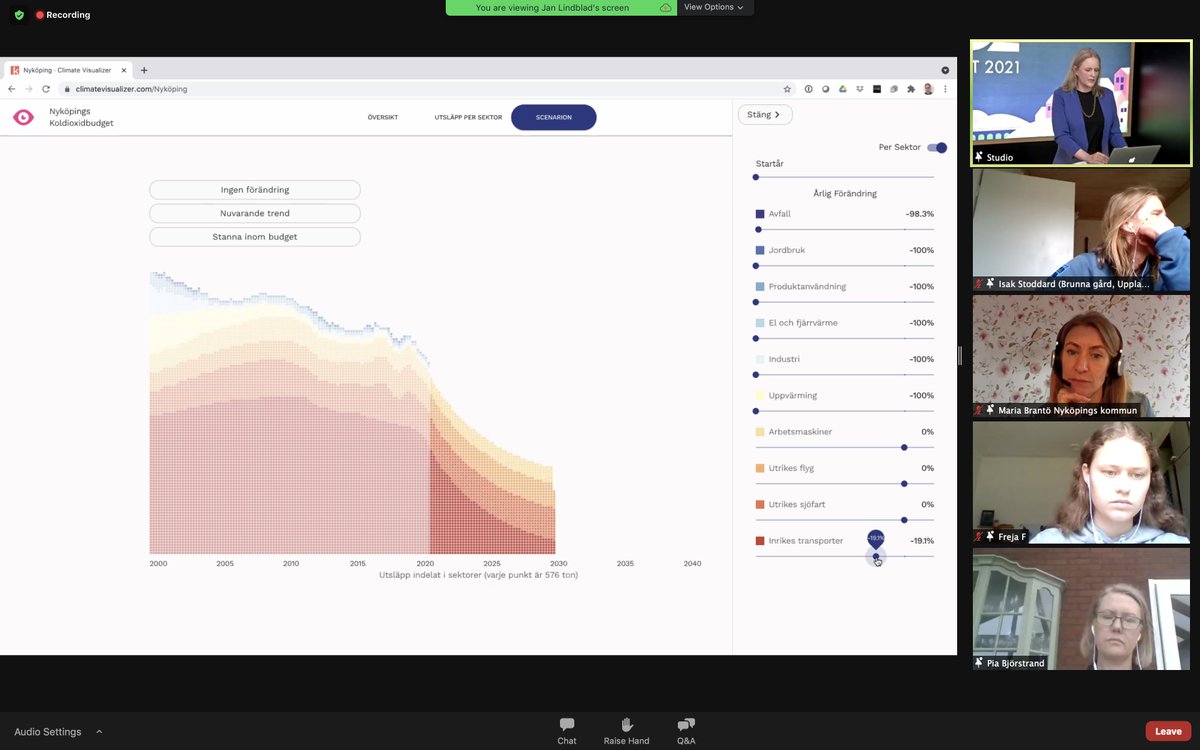
29. How to make necessary climate emission reductions happen? "We have to think about what science requires, not starting from what is politically possible" Pia Björstrand #lawyersforfuture Nyköping. #co2budget2021
30. Anders Heggestad @klimsek showing how #co2budgets2021 can be used as a tool to translate the #IPCC principle that "more emissions now mean less later" (bc fixed carbon budget = area under the curve). 

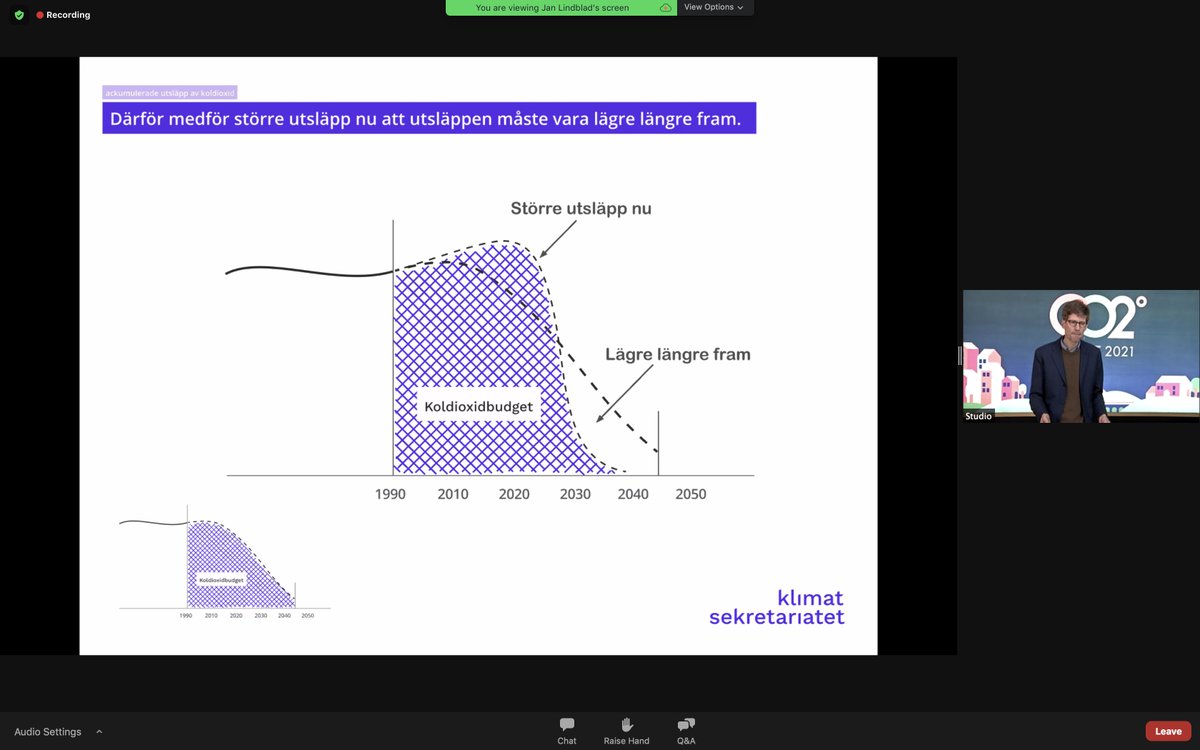

31. Anders Heggestad @klimsek shows examples of many Swedish cities who have already produced or are working with #co2budget2021.
A guide for cities for science-based climate targets from @c40cities:
c40knowledgehub.org/s/article/Scie…

A guide for cities for science-based climate targets from @c40cities:
c40knowledgehub.org/s/article/Scie…

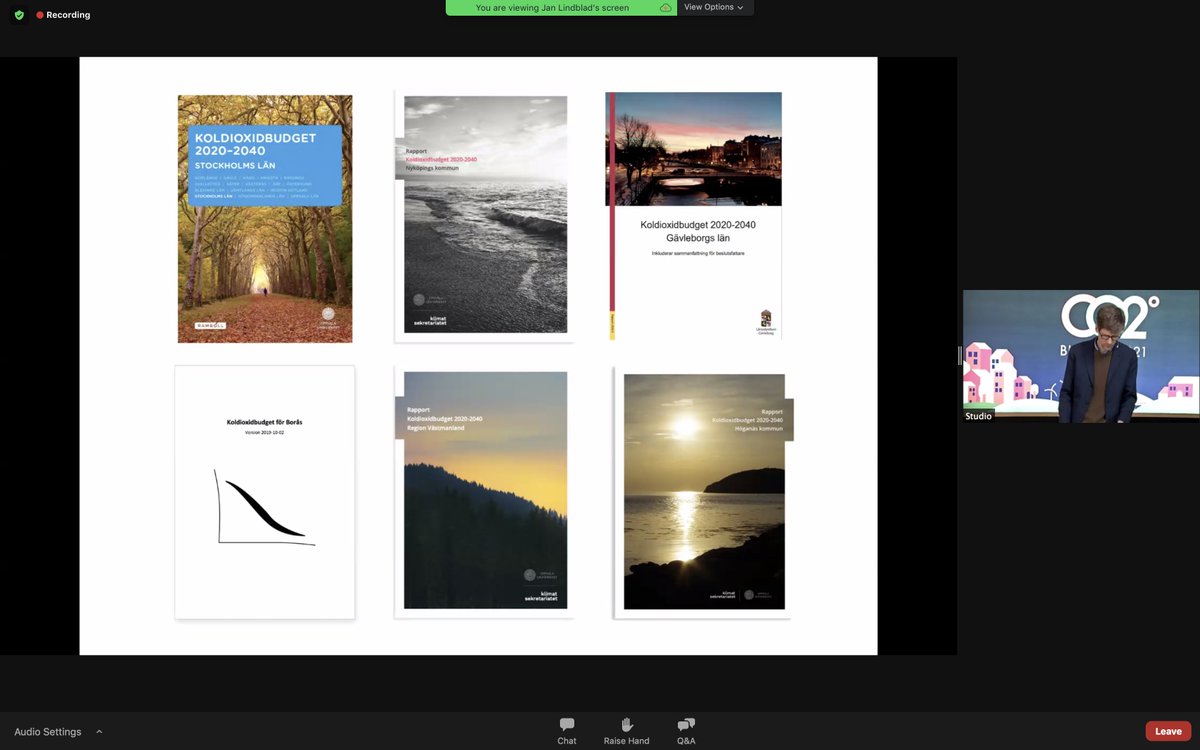
32. Making + communicating a #co2budget2021 for Tidaholms municipality- identifying, ranking, quantifying policies that can reduce emissions. Communicate: budget means emissions reductions within a set time and all feel responsible to contribute. Hanna Tornevall @ChalmersIndustr 



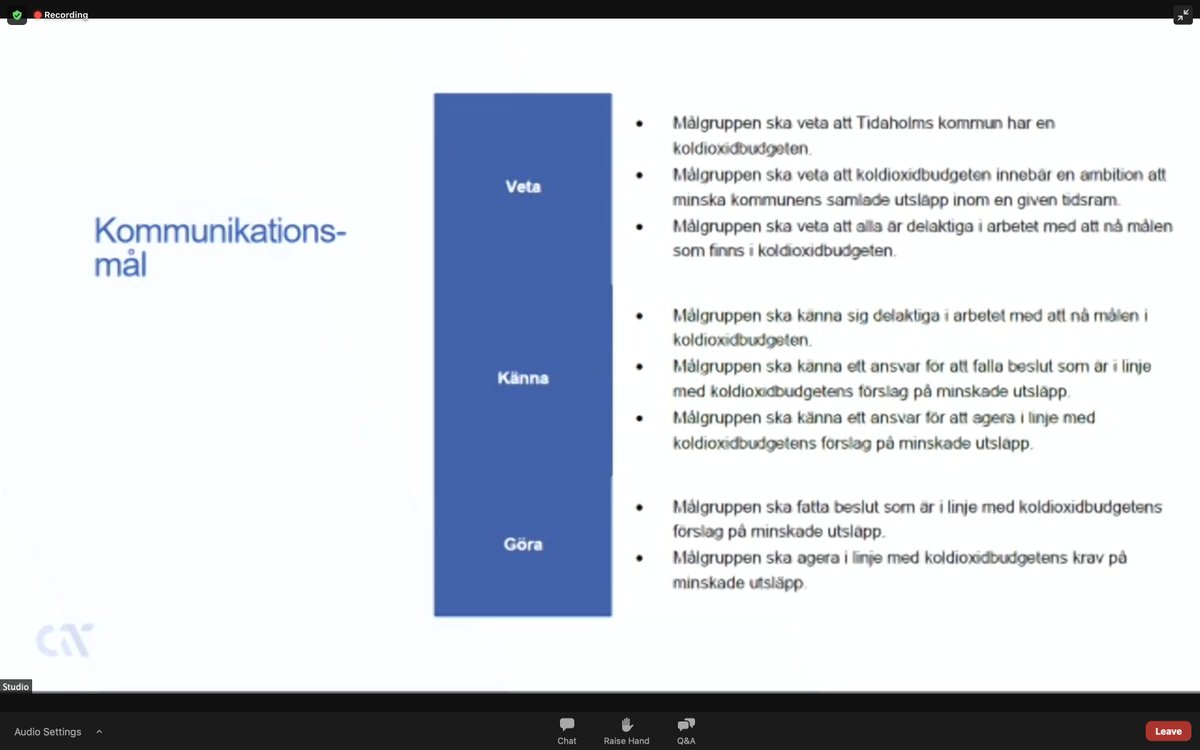
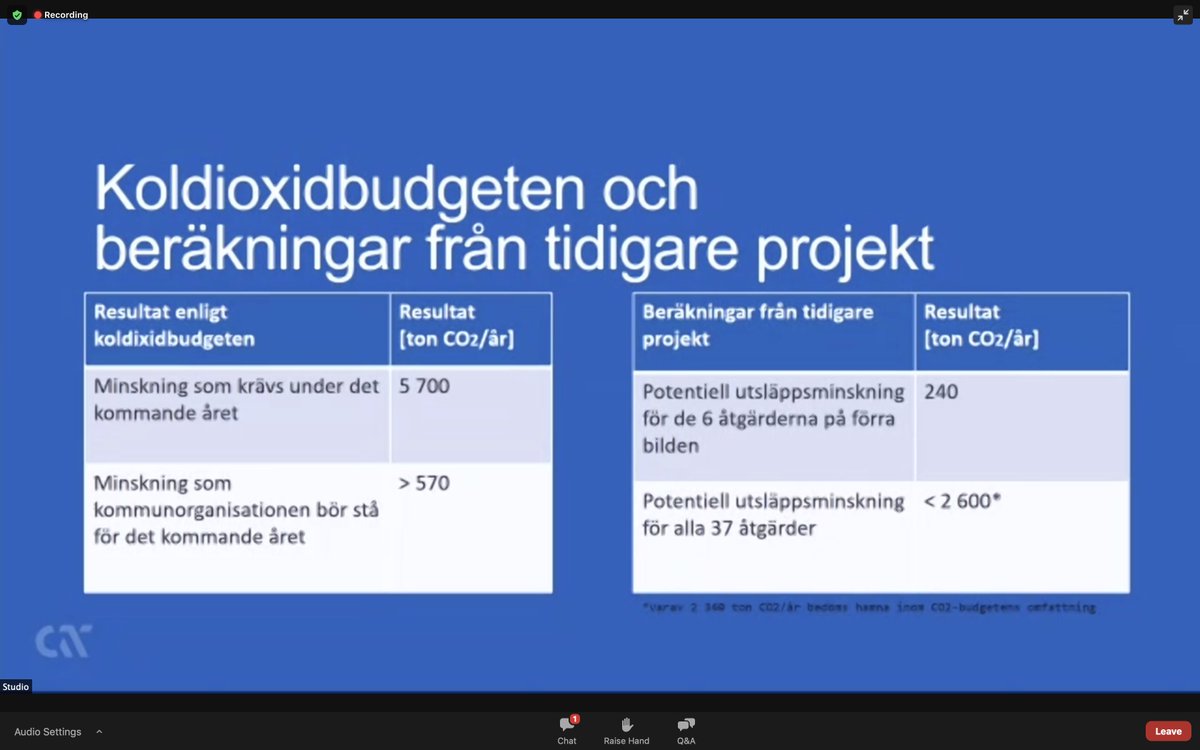

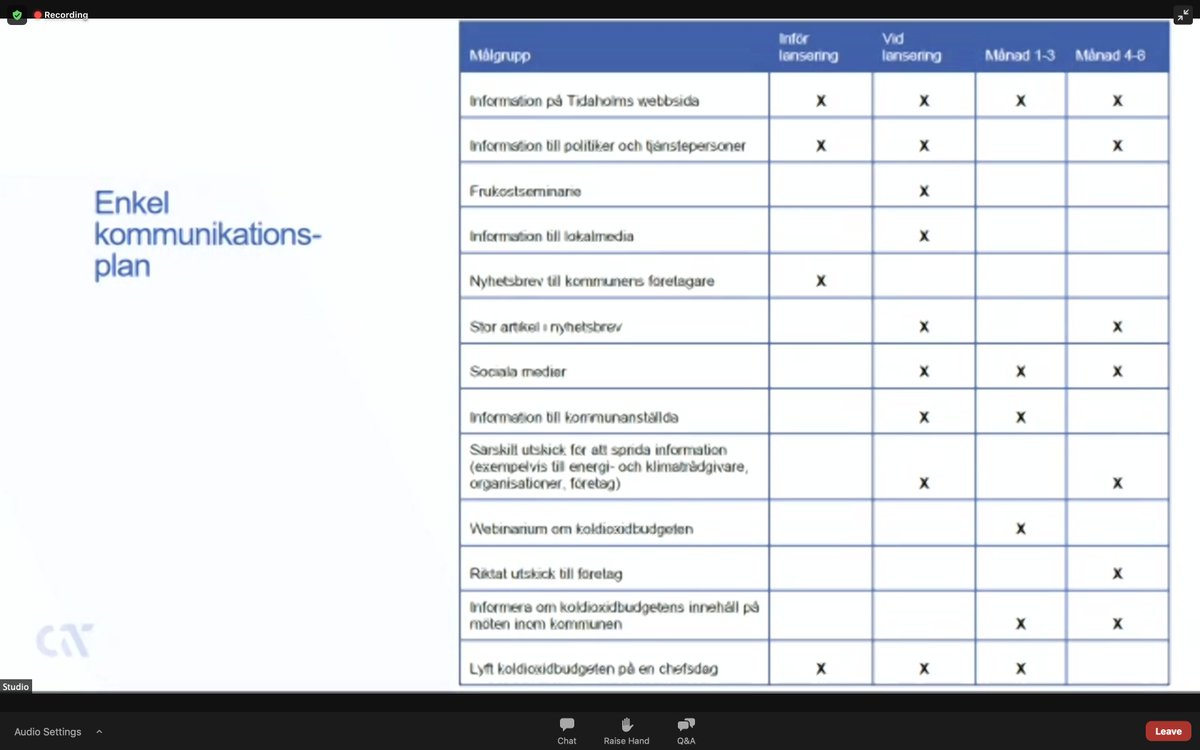
33. We have to focus more on what we do have agency and decision power over, not what we don't. If we all do that, we can take a big step forward in #ClimateAction, says @LiseNordin #co2budget2021
34. "How much will climate policy cost?" is the wrong question; typically ignores co-benefits. Including co-benefits can support politicians + civil society in ambitious policies.
@MikaelKarlsson_ #co2budget2021.
Review article: tandfonline.com/doi/full/10.10…
@MikaelKarlsson_ #co2budget2021.
Review article: tandfonline.com/doi/full/10.10…
35. Nyköping has an eye-popping goal to reduce transport GHG emissions 45% by 2025! This is the scale that #co2budget2021 requires. And they have a plan to do it, + good example from Groningen, who reduced city traffic by 44% with simple measures- Pia Björstrand. 



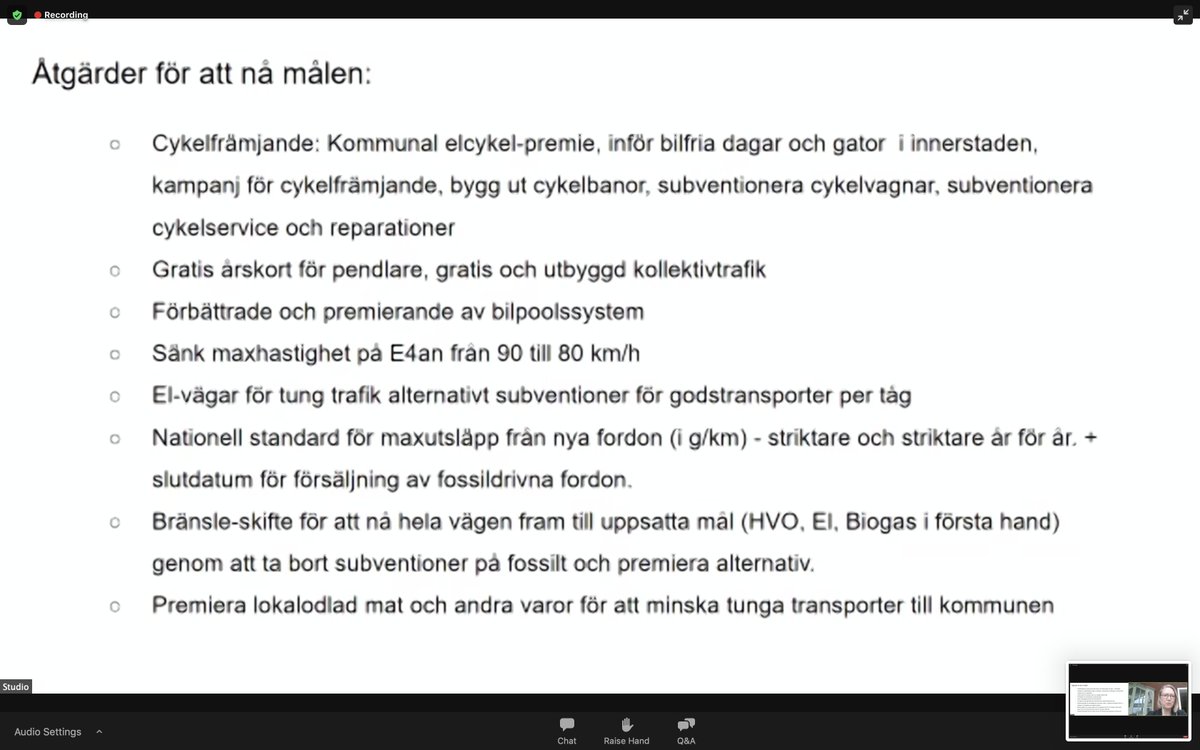
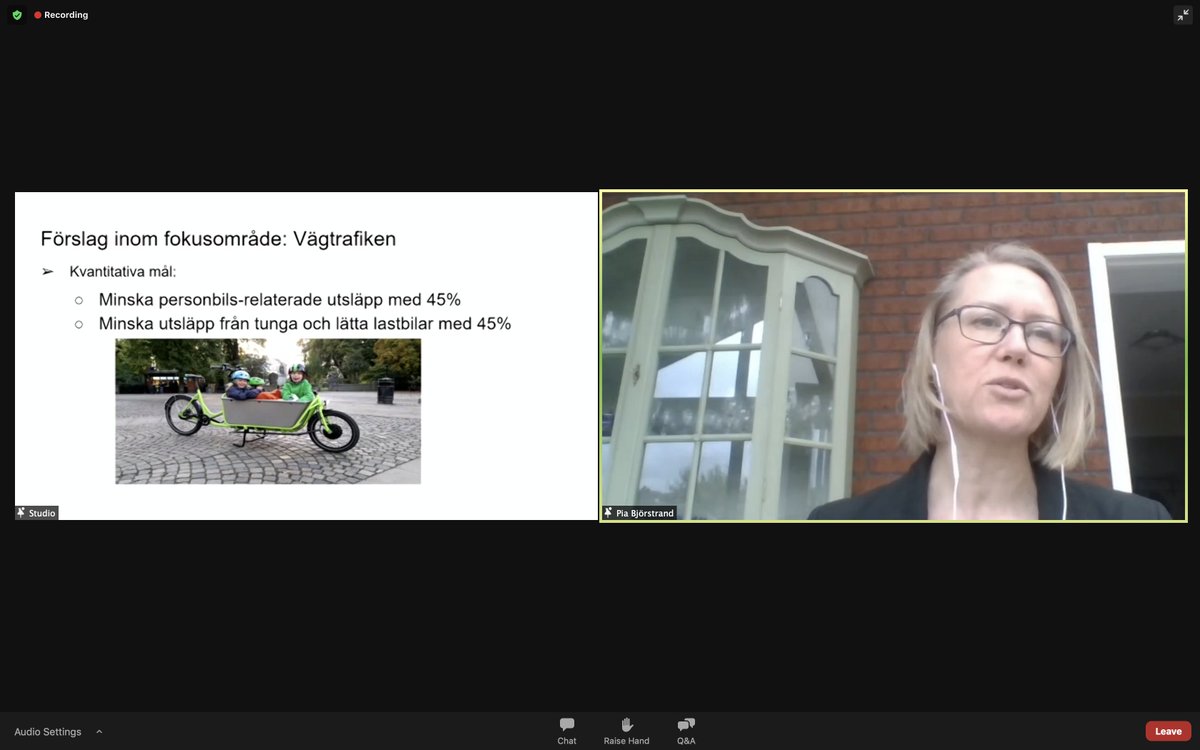
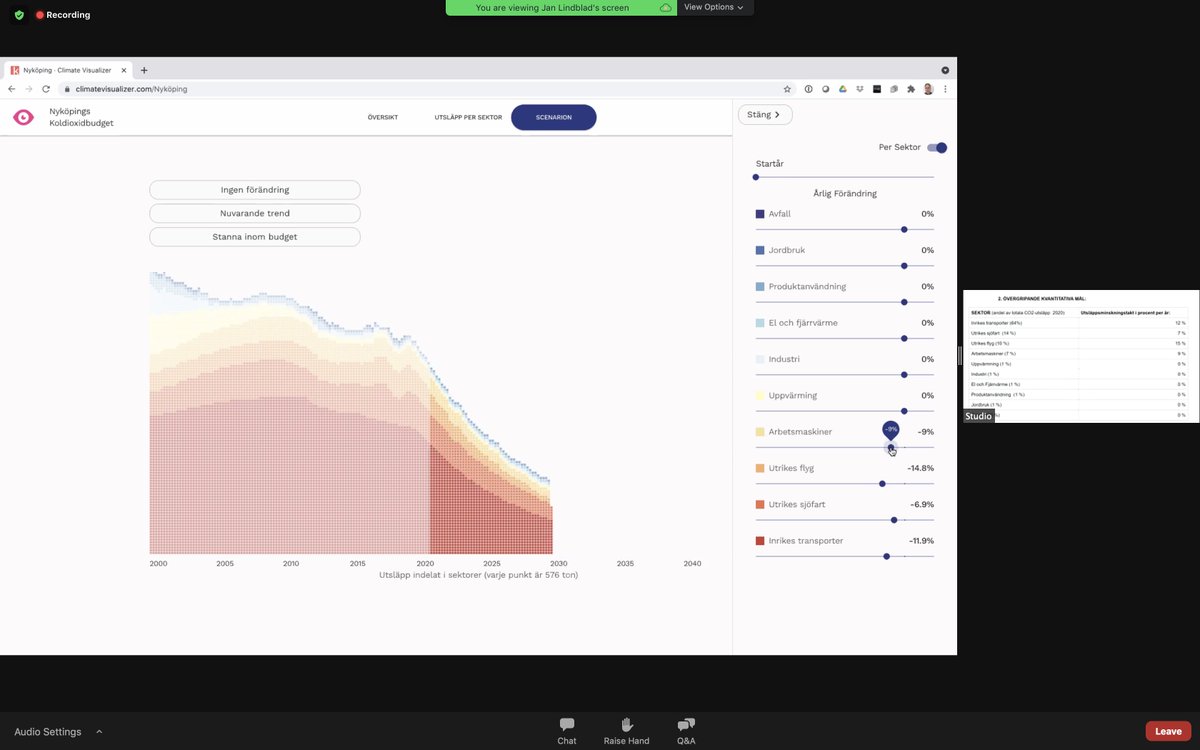
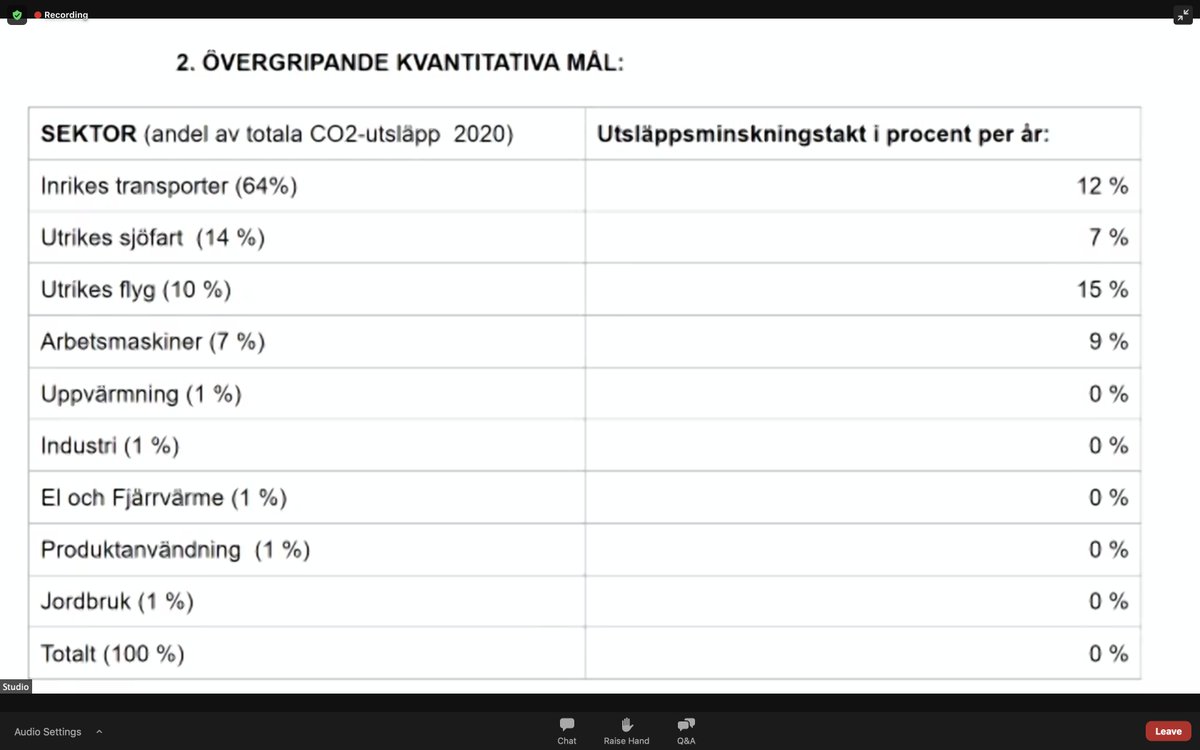
36. I'm impressed! Nyköping municipality in Sweden is following the transport pyramid to prioritize active travel; aims to cut flights (domestic + intl) 55%, with #flightfree campaigns; focused on reducing consumption-based emissions. #co2budget2021 




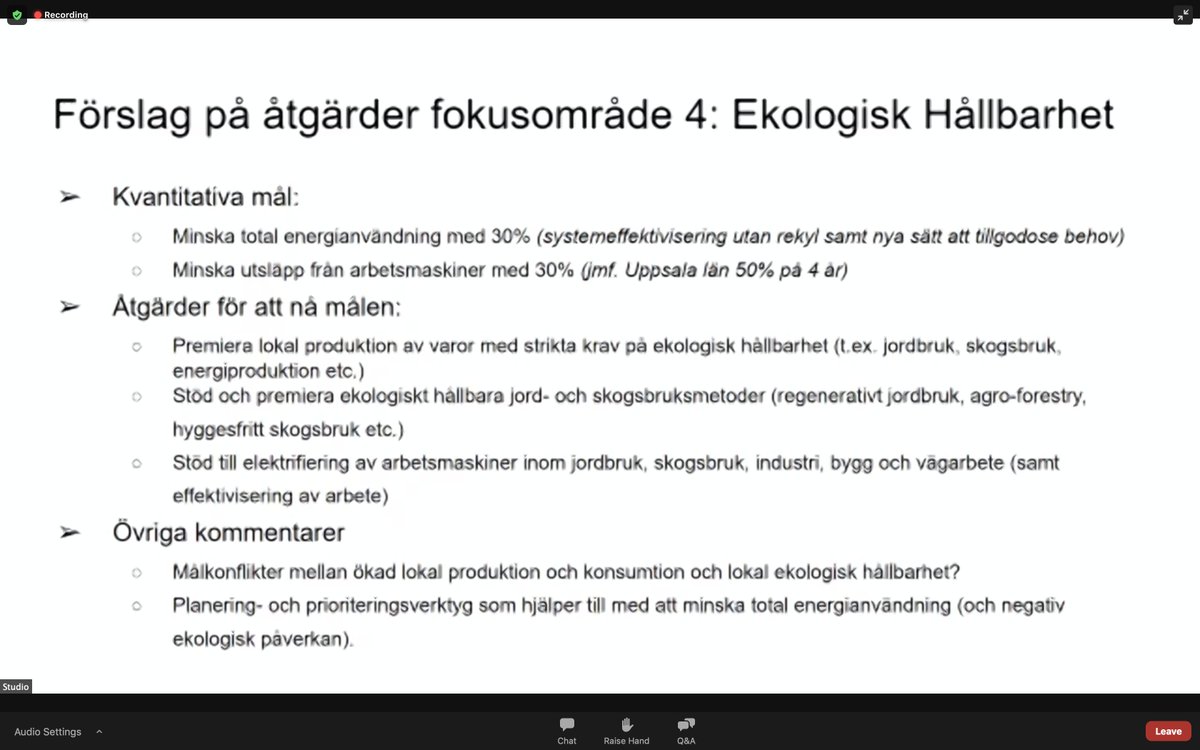
37. "The time is very urgent – we must slow down... Now, we think, is the time to ‘retreat’ into the real work of reclamation, to re-member again our humanity through the intimacy of our relationships." Lovely quote from @BayoAkomolafe cited #co2budget2021
bayoakomolafe.net/project/the-ti…
bayoakomolafe.net/project/the-ti…
• • •
Missing some Tweet in this thread? You can try to
force a refresh








